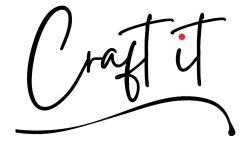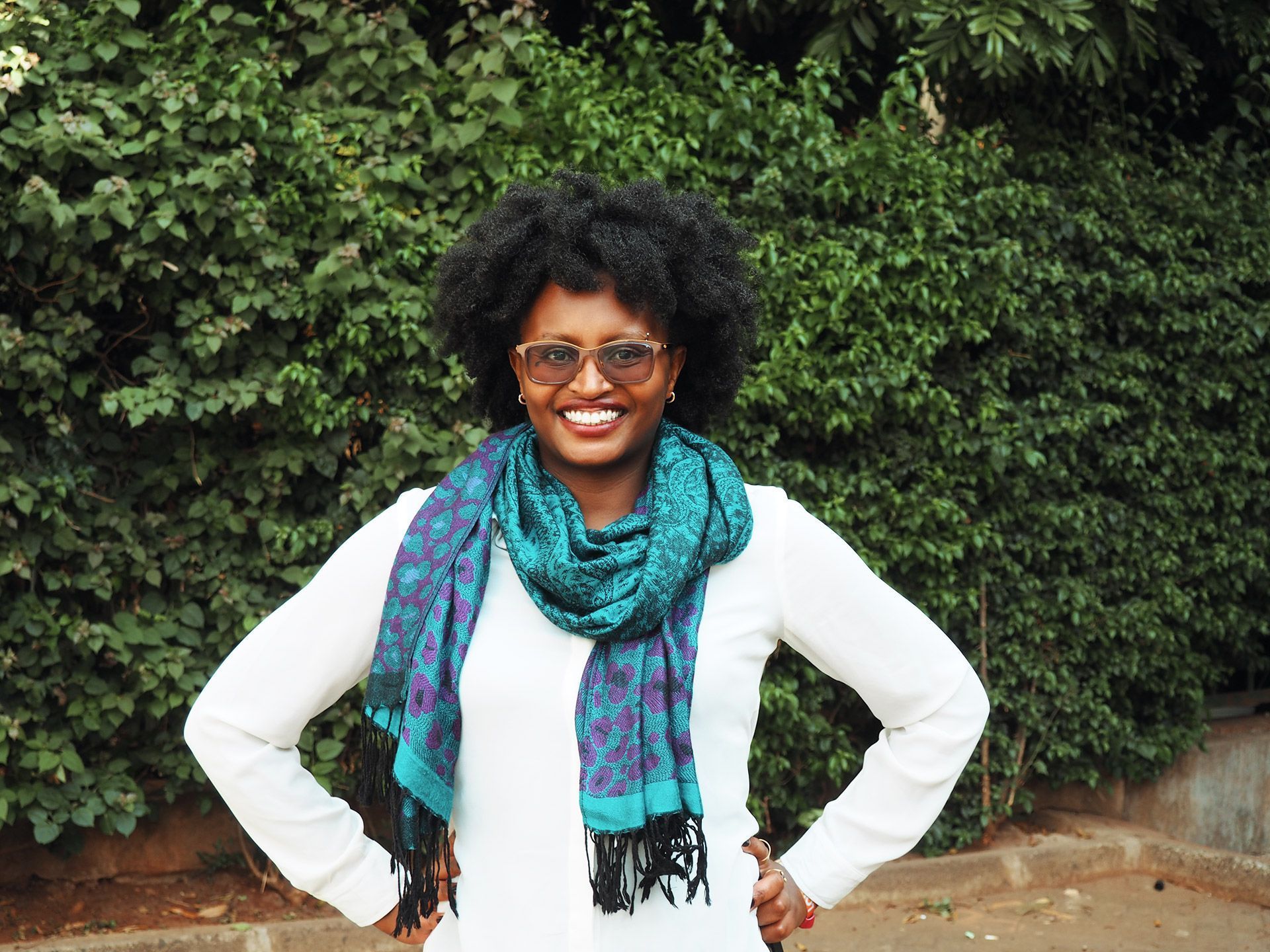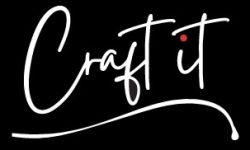BY FLORENCE BETT
“So your name is Mugethi Gitau?”
“Yes.”
“Spell that for me, please.”
“M-U-G-E-T-H-I G-I-T-A-U.”
Great! And your brand is…?
“Mugzie’s Naturals. M-U-G-Z-I-E apostrophe. S. Another word. N-A-T-U-R-A-L-S. Mugzie’s Naturals. Yes, you’ve written it correctly. I went into the business full time last October [2016]. I registered it as a sole-proprietorship.”
“What’s your business about?”
“I make products for natural hair care. I make them myself in my kitchen using ingredients I’ve sourced locally. Except for the shea butter, I get that from Uganda; all my products are based on shea butter. I make hair butter, body butter and extra-rich body butter, stretch mark cream, beard cream for men and lip butter. I also make scented shower melts and sell bentonite clay. Don’t worry,” she hastily adds when she notices how clueless I seem, “I’ll show them to you later. I store the butter-based products in my refrigerator,” she motions to her kitchen, “so that they won’t melt before I deliver them to my clients.”
“And how old are you? Kids, no kids? Married, not married?”
“I’m 33. I have a son, he’s seven. I used to be married but I’m not anymore.”
***
It’s the Saturday before the General Elections. I’m at Mugethi’s place on Ngong Road; I’m here to meet her for this feature story. The story already run in the Saturday Magazine (a week later, on 12 August) but it was such a fun story to do that I figured it wouldn’t hurt to redact it for Craft It.
I arrive for our interview half an hour later that we’d agreed because – sigh, I’m embarrassed to say this – because I was in the digs making sure that the boxes against GB’s ‘Post-election check list on family safety’ were all ticked. It’s a plan that read like it was from some National Brochure.
Indulge me for a moment, if you will.
Here’s what some of the sections said. Under ‘Food/Water stocks’, it said, “…A seven-day supply of food and drinking water for each person in your household is recommended. Remember dry pet food. Keep some food and water in the car.” (I chuckled at the pet food because we keep babies, not pets.) Under ‘Personal Documents,’ it read, “Centralise your important personal documents (e.g. passport, school and marriage certificates, property deeds) in order that you can access them in a hurry, photocopy these and ensure these are on a Cloud too.” (You gotta be kidding me.) “Should the situation escalate,” it said under the the section for ‘Grab Bag’, “pack a bag with essential items and keep it handy.”
It felt like we were preparing for a state of emergency.
GB was away for the weekend. He GB called to check in on my progress and I told him I had a few questions: Supposing shit hit the fan and we jumped into our “kitted, fuelled and serviced personal motor vehicle” would we go hide in some steel bunker located in an undisclosed address and maybe wear oxygen masks? Would Pastor Owuor join us down there?
What would be the criteria for letting people sleep on the mattresses or sleep on the floor, would they give priority to the mums like me with toddlers, or would we have to show them our scanned school certificates? If our own house caught fire, what’s the one gadget he’d run back into the building to get? What about a book, what’s the one book he’d go back in to get? Would his Kindle take priority over his – ? Hallo? Hallo?
He’d hang up on me mid-sentence.
As she waited for me to show, Mugethi watched a detective series on her laptop called Castle. She crotcheted mindlessly while at it.
When I walk past Mugethi’s front door – after we’d shaken hands in intros and I’d apologised for my tardiness – I ask her the one question I’m certain everyone who meets her for the first time does: “My goodness, is that your real hair?”
She chortles, obviously used to it by now and says, “Yeah, it’s my hair.”
“Woow! Can I touch it?”
She smiles. “Yeah, you can touch it.”
It is her real hair. Jesus. And it’s soft to the touch; soft and bouncy and dense. It’s moisturised to the right degree – not so little that it feels fizzy and not so much that you have to wipe your fingers down your sweater to rid yourself of the excess grease. Everything about it says that there’s plenty of thought that has gone behind its regimen. It’s healthy hair. Health happy natural hair. I wonder if they’ll one day write a song about it.
“No, no don’t take off your shoes,” Mugethi says when she sees me bend down to unstrap my sandals. “My son is away in Naivasha with his grandparents and I sent the housegirl on leave, so it’s just me. Don’t mind the mess, ha-ha, my son left his toys everywhere. Come in, come in.”
Mugethi’s living room feels like a recreation of a stage production, or like a frequented section from a creative’s garage: along two windows on either side of the room, mattresses sit on wooden pellets with blankets folded atop of them; a sewing machine branded ‘South China’ is tucked in a corner next to low-lying pallets, it doubles up as a table; this table has a dizzying array of knickknacks – blue kitengee pouches with their drawstrings hanging loose, tall and stubby thick-walled glass jars of product capped with their metallic lids, little black bottles of essential oils, screw-on tubs of lip balm, lollipops, brown bags, sewing threads and buttons… it seems disorderly at first glance but, later, when Mugethi stands next to it and patiently explains to me what’s what, I see the meticulous cataloguing of testers, earlier versions of packaging, accessories, tags and half-completed thoughts.
This table is where the novelty of her old ideas meets the progress of the new ones. It’s the road map to what-next for her business. It’s a compass whose bearing she determines. Everything her business stands for – yesterday, today and tomorrow – stands on that table. If that table understood this, I’m certain it would collapse from the heft of its responsibilities. I admire that table.
On the other end of the living room, next to the kitchen door, is a wooden bookshelf with novels and children’s books stuffed in-between them.
I poke my nose in the air and sniff hard; I catch the whiff of shea butter suspended like a mist above the living room.
Mugethi and I seat across from each other at her dining table. She’s laid out a tray with a thermos of hot water, and Tupperware of tea bags, sugar and ginger nut biscuits. Mugethi invites me to make myself a cup of black tea, she keeps crotcheting.
“What’s that you’re making?” I ask as I set up my voice recorder and open a fresh page on my notebook.
“A demure cardigan for myself. I also made these leg warmers I’m wearing,” Mugethi pokes out one leg from under the table and I nod approvingly at her handiwork. “I just love crotcheting! I learned it from my mum, how to be a DIY person.” I look up ‘demure cardigan’ on Pinterest later. It has wings and flaps and all. Looks like it can double up as a parachute should the situation call for it.
“And you are able to multi-task,” I ask, “to pay attention and speak as you crotchet?”
“Oh yes, yes!” says Mugethi “I do it without thinking, really.”
Mugethi’s eyes open wide behind her glasses when she speaks. Her voice has a cadence that reflects what she’s speaking about: it rises when she’s talking about her son or her family or her business, and lowers when she talks about cracking under the pressure of employment. For the two hours that we speak, her fingers neither slip nor stutter as she crotchets and talks. This is the clearest example of the muscle memory at work.
“Alright, so we’ll chat like it’s a conversation,” I say, as I spoon two sugars and drop a tea bag into my mug of hot water, “just speak freely, OK? We’ll take it from the top and you’ll carry on from there. If I have questions I’ll jump in and ask, OK?”
Mugethi nods.
***
“Tell me about your family; about your siblings and your parents?”
Mugethi says, “Well, I’m the first in a family of four kids; I have only one brother. We grew up in Naivasha town. My father was a civil servant who bought for me many many books and encouraged me to read; I learned how to enjoy reading storybooks from him. My mum is an early childhood teacher, she’s always had kindergartens. There was one that was very famous when were growing up in Naivasha. She’s now a teacher in Doha, Qatar. Yes, everyone has an afro.”
“Who’s your favourite writer then?” I ask.
“Chimamanda.”
“Why?”
“Because she writes like me.”
“Or maybe it’s you that writes like her?”
Mugethi laughs. “Maybe. I blog by the way, Miss Mugethi dot com. You should check it out.”
Mugethi graduated from Moi University in 2004 with a major in Information Technology. She relocated to Mombasa soon after she graduated and started her work life. She was a college lecturer for one year then a high school teach for five – achieving some level of seniority, she says – and ran a string of side-hustles while at it: she ran a business centre which had a cyber cafe, then a simu ya jamii, then a bar and restaurant, designed wedding card invites and websites.
“Why were you running all these side-hustles?” I ask.
“It wasn’t really for the money,” she says. “It was for…” She pauses. “Running these side-hustles made me happy. Yeah, they made me happy.”
Mugethi returned to Nairobi in 2009 and worked for a year as an assistant on a government-funded project; they let her go because she became pregnant, she says. Mugethi had her son in October 2009 and was home on maternity leave for six months. After, she got a gig with a microfinance in Kariobangi that worked with orphans then became an Assistant Country Director with a donor-funded trust. On the side, she brokered land. She got into tech in 2013, and worked with the iHub and a coding school as a community manager (manages social media).
“My last job was as an operations manager with a tech start-up. The title was fancy but the work was crazy!” Mugethi says and chuckles. “I was doing operations so I was in-charge of admin, finances, HR, communications… It was a lot, and it even started affected me health-wise; my hair thinned and my lips turned black. I knew it was time to quit when I became stressed and I couldn’t do my job anymore. I remember this one time at a meeting when I cried…”
“Oh no, you didn’t –,” I say, putting my face in my palm.
“…and the men just looked at me and wondered what was wrong with me.”
“Oh noo.”
“…and it was so embarrassing for everyone.”
“Oh no!”
We laugh out aloud for a few moments.
I say, “You know what they tell us – us, as in women – about showing your tears in the workplace, right? Ha-ha.”
“I know!” Mugethi says. “Gosh, I know.”
(Raise your hand if you are a woman reading this and have never cried at work. OK, you can put your hand back down, you Show Off. Heehe.)
I catch my breath then ask, “Looking back at the things you’ve done and your colourful career, what has it taught you about yourself?”
Mugethi thinks for a moment and keeps crotcheting. Slowly, she says, “I learned that I’m resilient, versatile and have a diverse set of talents and skills.”
***
“Let’s talk about your hair. When did you go natural?”
Mugethi fixes herself a cup of tea and says, “I went natural in 2011. But you see, as a little girl, I didn’t have the opportunity to keep my natural African hair. When I was going to boarding school in form one, my mum put for me a straight kit because she said it would be easier hair to maintain. Straight cut was curly kit but you didn’t put in the curls and –.”
I interrupt Mugethi and say, “Man, I remember how oily those curly kits used to be.” We both chuckle. “Was it really called a ‘curly kit’ ama just ‘curls’? Wasn’t curly kit like, the kit that would make the curls?”
“I know, right! Ha-ha.”
“I remember on my mum and how oily it used to be,” I say. “She couldn’t can’t sit down without leaving a oily patch on the back of her seat. Plus my Ol’Man complained to her that the sink was always full of hair and oil.”
We both burst out in laughter.
Mugethi recomposes herself and continues, “So yeah, I relaxed my hair when I was joining campus and by that time Dark and Lovely had come and my hair took it so well. And my hair kept prospering after that until I had my baby in 2009. My hair used to go all the way down my back. But remember I told you about the difficult year I had in 2011, with work and stuff? Yeah. My hair thinned and it got weak.”
Mugethi shows me photos on her phone. She says, “Do you see it from that photo, right before I cut it – the old thin shiny hair and the new thick hair that was growing? Yes. I was worried about cutting it because I didn’t know how I’d look with short hair. Plus there was pressure from society to appear serious and professional, and it wasn’t by being natural. I made a conscious decision to defy these expectations.”
Mugethi pauses, sips from her cup of tea as she crotchets then says, “There also wasn’t much info about how to care for natural African hair. There were also no local products made specifically for natural hair, and hairdressers didn’t know what to do with it. All this was a disenfranchisement of the African culture – I started making these products and selling them because I wanted to get back our cultural pride.”
From 2011 to 2013, Mugethi experimented with oils she’d bought off the racks at beauty shops – olive, castor and coconut oil, essentials oils and beeswax. She’d mix them up and take note to how her hair responded to these homemade concoctions. Some concoctions made her hair happy, she says, others dried it out until it as wiry as sisal. She weaved her personal product experience with extensive Internet research until she became a natural hair care guru in her own right.
“In late 2013, a friend brought me shea butter from Ghana. It varied in thickness from the one I later bought from South Sudan. Sudanese call theirs ‘lulu’ and use it for cooking and as a body cream. Shea butter is grown along River Nile so I was also able to get some from north Uganda. I’d use it to cold-whip hair butter and lip balm, give the products away to my friends then I’d experiment again.”
So by the time Mugethi was quitting her job in 2016, she had good grasp of what shea butter can do for different types of natural hair when mixed to the right ratios with oils.
She made her first sale the October she left her job and since then, Mugethi has put her ears on the ground and listened to her customers’ feedback. She has majorly relied on it to tweak her formulations and expand her product range. Even her thoughtful packaging – the glass jars with the how-to-use tags, the pouches handmade from blue kitengee fabric, the butters that are stored in the refrigerator before dispatch – is in response to her customers feedback.
Mugethi says, “My customers have also been asking for me to make leave-in condition and shampoo, so my cosmetologist and I are in the process of formulating them.”
We’re silent for a few moments as I go through the story and structure it in my head. I ask reflectively, “What has this first year in business been like? What has it taught you?”
“It’s been an adventure!” Mugethi says. “I’ve grown fearless and resourceful. My business is not paying me a salary yet I work on it full time, I’ve never been this broke in my life.” Mugethi scoffs. “I’ve also learned to become a negotiator – negotiating with my son’s school for fees, negotiating with my suppliers of raw materials, negotiating with my landlord for rent…” She laughs out aloud. In a soft voice, she adds, “The business breaks-even each time I sell a product but I’ve had to continue with some of my side-hustles to stay afloat.
“I’m at a crucial stage now because the business is rapidly growing; I have repeat customers and we sell at least seven items every day. I sell mostly through social media and at the K1 flea market every Sunday. I produce on Thursdays and Saturday, and sometimes on a day in between the week when stuff has run out. Last April, I got a campus student to assist me with production and making deliveries; she really got a lot off my chest. ”
***
Weeks later, I return to Mugethi’s place to watch her produce a batch of Extra-rich body butter.
In the kitchen, I watch as Mugethi measures the beeswax and uses formulas on an Excel worksheet to determine the quantities of shea butter and cocoa butter she’ll use in proportion. She measures them to the gram using a digital weighing scale, allowing a small margin of error. These formulas are her trade secret.
She puts the wax and butters in a sufuria to double boil, then let’s them cool in the refrigerator. When they are cooler and a softer shade of color, Mugethi uses an electric mixer to whip up all the ingredients to a consistent degree. Then, she uses a tea spoon to pack the product into the glass jars. She puts the jars into the refrigerator, where they’ll be tagged before being dispatched to her clients.
The entire process of production takes two hours.
***
What Mugzie’s Naturals offers
– Hair butter
– Body butter
– Extra-rich body butter (with cocoa butter)
– Stretch mark cream
– Beard cream for men
(250gm pack at Sh650. Jumbo pack at Sh1,000)
– Lip butter: A tube at Sh300
– Shower melts: 3 rocks at Sh300
– Bentonite clay: Jumbo pack at Sh650
– Essential oils (lavender, peppermint, eucalyptus, clove and tea tree): 100ml bottles at Sh300
Reach Mugethi
Facebook: Mugzie’s Naturals
Instagram: Mugzie’s Naturals
Cell phone: 0722383289
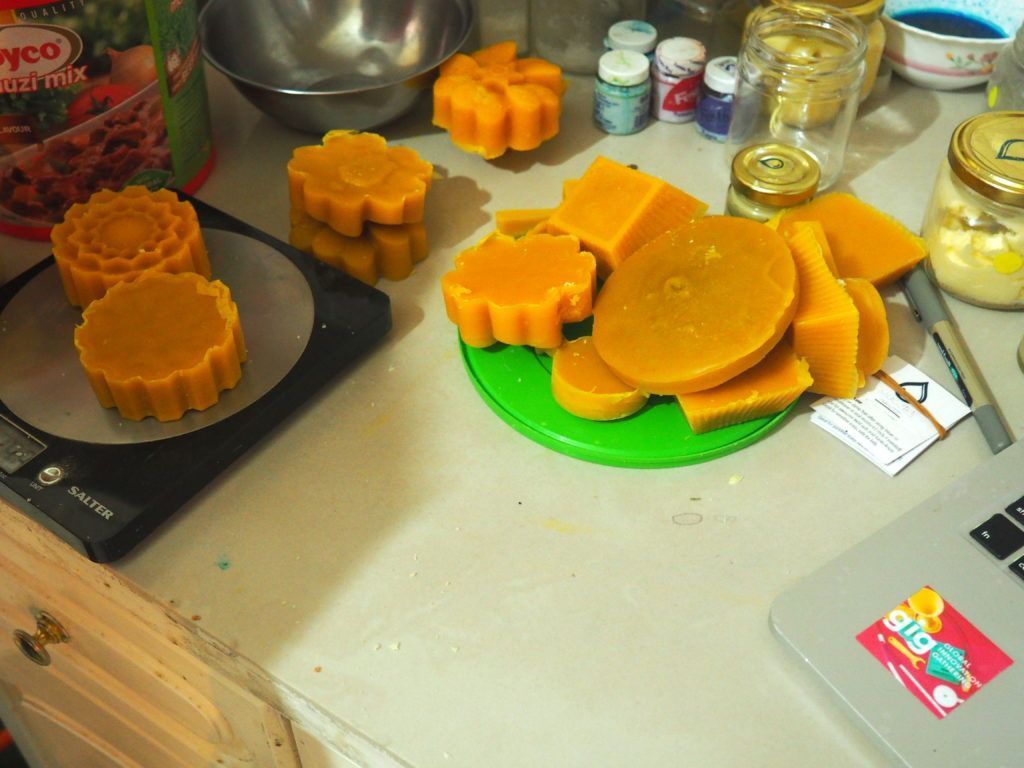
The raw materials – beeswax and cocoa butter
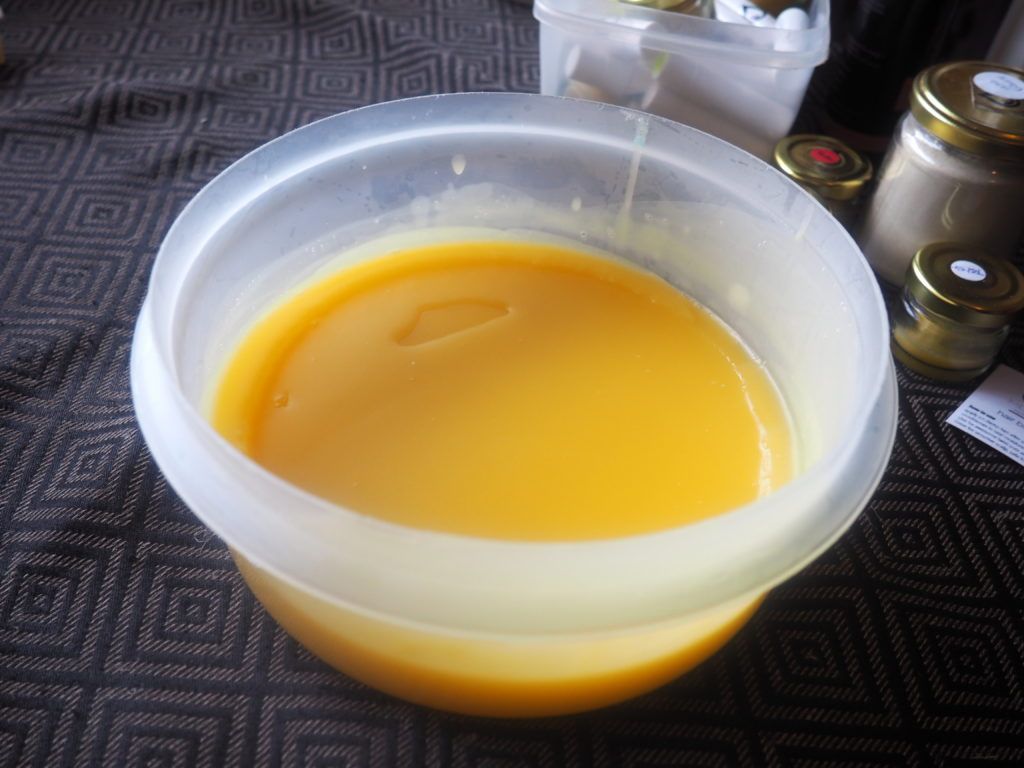
The raw materials after they’ve been double boiled then cooled
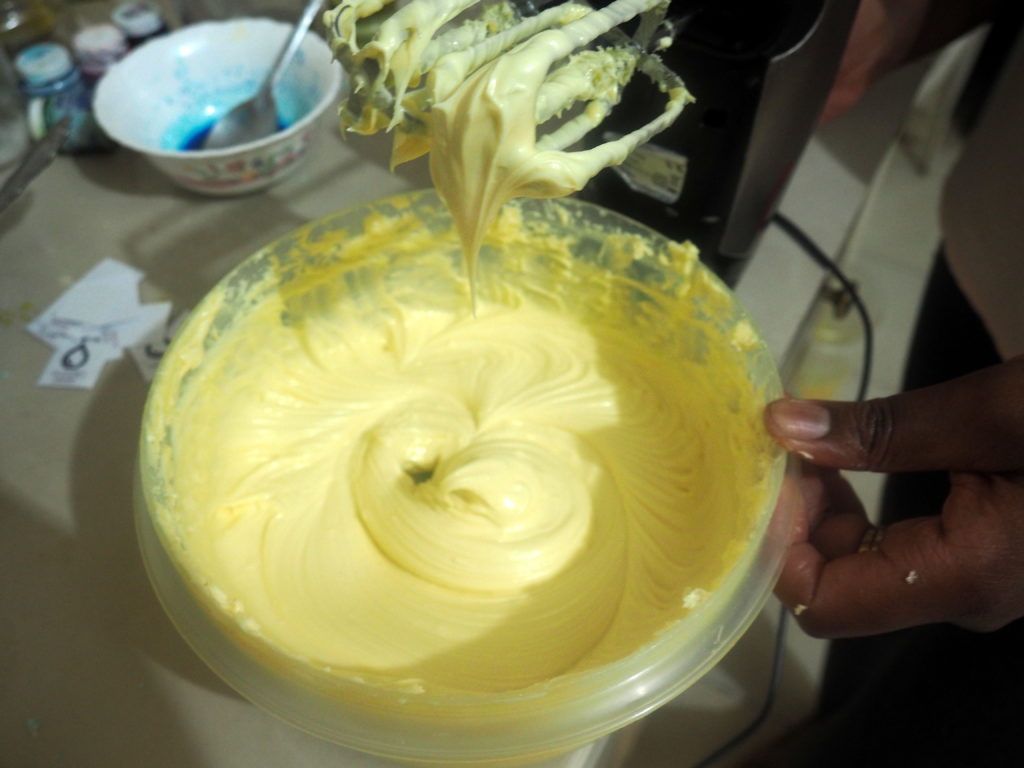
The cooled butters whisked and ready for packing
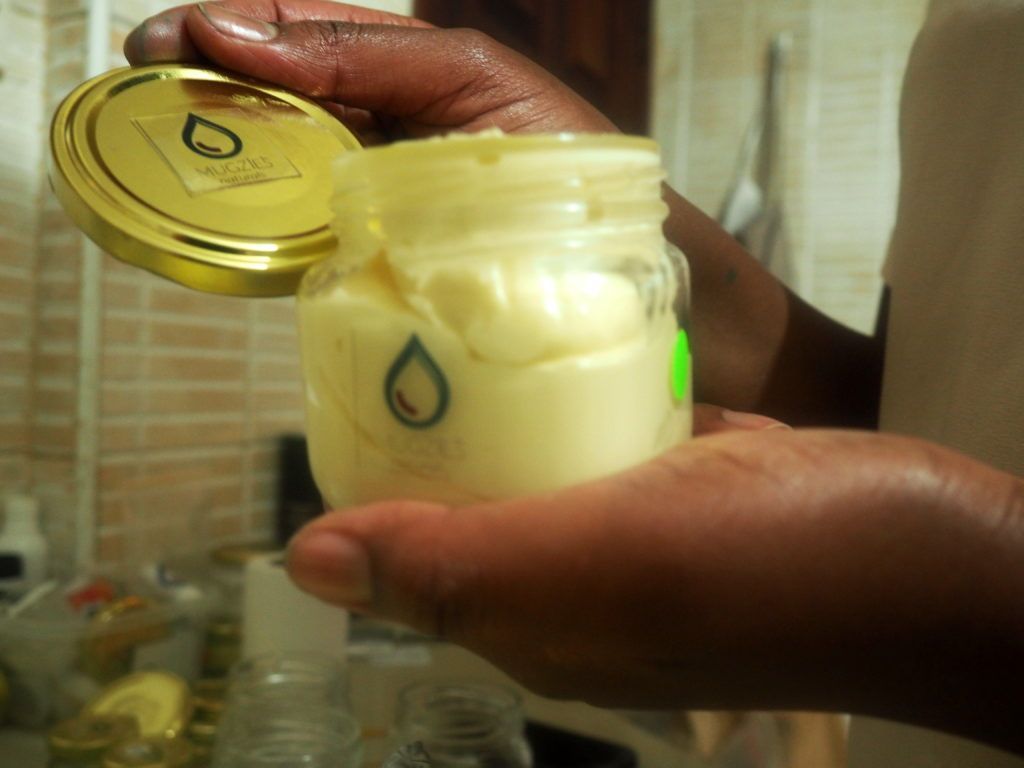
Product packed into a 250gm jar then to the refrigerator
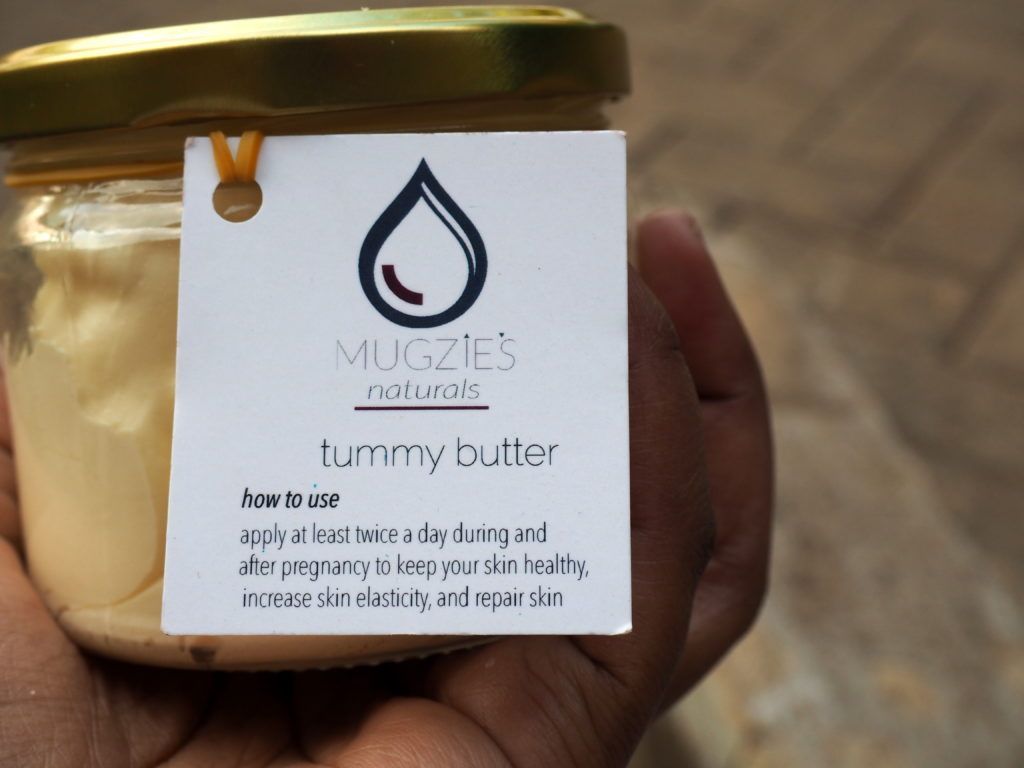
A tagged product ready for dispatch
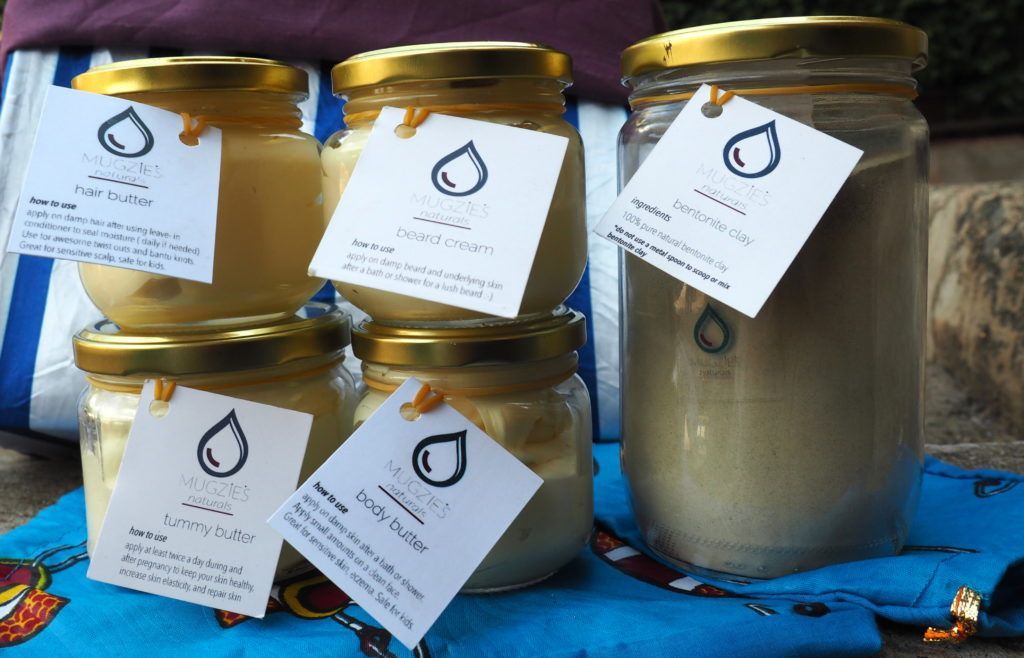
Some of the other products Mugethi makes/sources and sells
